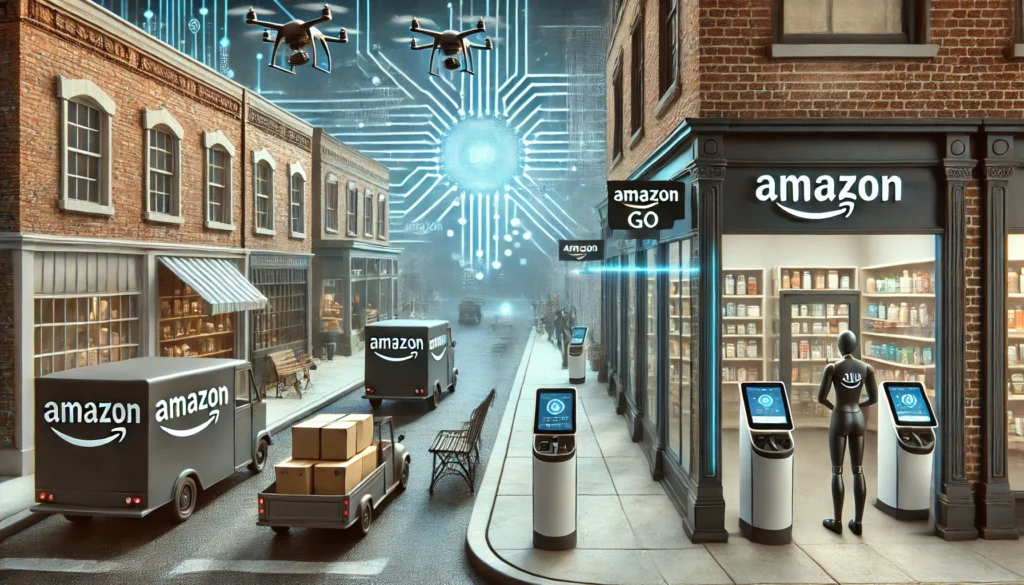Is Amazon E-Commerce?
The Rise of Amazon in the E-Commerce Industry
Amazon has revolutionized online shopping, making it one of the most dominant e-commerce platforms worldwide. It started as an online bookstore in 1994, founded by Jeff Bezos, but quickly expanded its offerings to include electronics, clothing, household goods, and much more. Today, Amazon serves millions of customers across different countries, shaping the future of e-commerce with its innovative business strategies and technological advancements.

Amazon’s E-Commerce Business Model
Amazon operates on a multi-faceted business model that sets it apart from traditional retailers. The company provides an extensive range of products through its online marketplace, allowing third-party sellers to list and sell their products. This model enables Amazon to offer a diverse selection of goods while earning revenue through commissions, advertising, and fulfillment services.
One of Amazon’s most successful strategies is its Prime membership, which offers benefits such as free shipping, exclusive deals, and access to streaming services. This subscription-based service has contributed significantly to Amazon’s revenue while fostering customer loyalty.
How Amazon Dominates the E-Commerce Market
Amazon’s dominance in the e-commerce sector is largely due to its customer-centric approach, advanced logistics, and use of artificial intelligence. The company continuously invests in automation and data analytics to personalize shopping experiences, optimize pricing, and streamline delivery processes.
With warehouses and fulfillment centers strategically located across the globe, Amazon ensures fast and efficient delivery services. The introduction of same-day and next-day shipping has raised consumer expectations, pushing competitors to improve their logistics operations. Additionally, Amazon’s AI-driven recommendation engine enhances user experience by suggesting products based on browsing and purchasing history.
The Role of Amazon Web Services (AWS) in E-Commerce
Amazon Web Services (AWS) plays a crucial role in the company’s e-commerce success. AWS provides cloud computing solutions that support Amazon’s vast digital infrastructure, ensuring smooth and secure online transactions. Many businesses, including e-commerce startups, rely on AWS for hosting, data storage, and analytics, further solidifying Amazon’s influence in the online retail industry.
Amazon and Third-Party Sellers
Amazon’s marketplace is home to millions of third-party sellers who contribute significantly to its e-commerce ecosystem. The Fulfillment by Amazon (FBA) program allows these sellers to store their products in Amazon’s warehouses while the company handles packing, shipping, and customer service. This model attracts entrepreneurs and small businesses, providing them with a global platform to reach customers without the complexities of logistics and distribution.
However, third-party sellers also face challenges such as intense competition, fluctuating fees, and changing policies. Despite these obstacles, many businesses thrive on Amazon’s marketplace, leveraging its vast customer base and marketing tools to drive sales.
How Amazon is Transforming Traditional Retailers
Amazon’s success has significantly disrupted traditional retail industries. Many brick-and-mortar stores have struggled to compete with the convenience and competitive pricing offered by Amazon. As a result, retailers have adapted by enhancing their online presence, adopting omnichannel strategies, and investing in e-commerce platforms to meet consumer demands.

Retail giants such as Walmart and Target have expanded their digital operations to compete with Amazon, offering online ordering, curbside pickup, and fast delivery services. This shift highlights the growing influence of e-commerce and the need for retailers to innovate in a rapidly evolving digital marketplace.
Amazon’s Expansion into New Markets
Amazon continues to explore new markets, expanding its reach beyond traditional e-commerce. The company has ventured into grocery delivery with Amazon Fresh and Whole Foods Market, providing consumers with convenient shopping options. Additionally, Amazon’s involvement in smart home technology, healthcare, and artificial intelligence showcases its ambition to dominate multiple industries.
With the introduction of cashier-less stores through Amazon Go, the company is redefining the shopping experience by leveraging AI and sensor technology. These innovations reflect Amazon’s commitment to enhancing convenience and efficiency in retail.
The Future of Amazon in E-Commerce
Amazon’s influence in the e-commerce industry is expected to grow as technology advances. The company continues to invest in automation, drone delivery, and sustainable practices to meet evolving consumer expectations. As competition intensifies, Amazon remains at the forefront of digital commerce, setting new standards for online shopping.
The rise of mobile commerce, voice shopping, and AI-powered customer support further solidifies Amazon’s position as an industry leader. With a focus on innovation and customer satisfaction, Amazon is poised to shape the future of e-commerce for years to come.
Conclusion
Amazon is not just an e-commerce platform; it is a global phenomenon that has transformed the way people shop. Through its customer-centric approach, technological advancements, and expansive product offerings, Amazon continues to dominate the digital marketplace. As the e-commerce landscape evolves, Amazon’s adaptability and innovation will ensure its relevance in the ever-changing world of online retail.